Impressions: A tale of faith-born acceptance
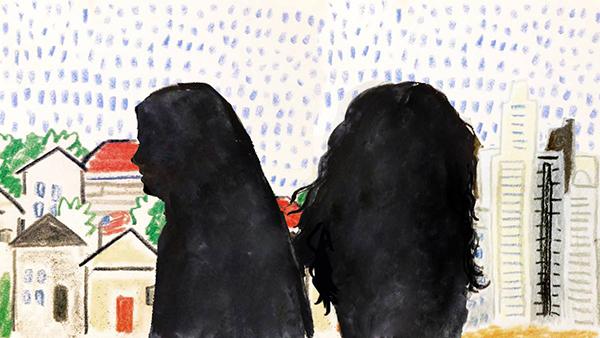
Illustrations by Megan Eloise/The Gazelle
November 3, 2014
This article comes from the Global Desk, a collaboration between The Gazelle, WSN and On Century Avenue. Read more by searching ‘global.’ This is a personal essay.
People are often surprised to hear that a liberal, curly-haired Emirati and a conservative, veiled American girl are inseparably close friends, let alone able to tolerate one another.
It seems that many people at NYU, despite the university’s self-proclaimed aim to foster dialogue between people of different backgrounds, cannot comprehend our juxtaposition. It is not out of the ordinary to hear others remark, “But isn’t she a fundamentalist-conservative? And isn’t she a queer-liberal? And aren’t they both hypocrites?” and even make accusations of aborted pregnancies and virginal prudishness. We want to tell the story of our religious experience, as well as our friendship, in order to open up dialogue on acceptance through faith.
Samia:
Heir to a Pakistani heritage, I was born and raised in the United States and educated in a private Islamic school from second through 12th grade. Despite the diversity of ethnicities represented at my school, transitioning to the intellectual world of college has made me realize that the community I hail from is actually mostly homogenous in terms of the type of Islam embraced and practiced. University life, through academics and personal relationships, has really illuminated the fact that the global ummah, or Islamic community, encompasses an entire spectrum of Islamic views, beliefs, practices and ideologies. These realizations and experiences have produced changes in me and the way I think about Islam and the world in general. I now make an attempt to approach my interactions with other Muslims, Islamic texts and scholarly opinions with a more open mind.
Raised in what I consider both a conservative and non-traditional household of Hadhrami heritage in Abu Dhabi, I’ve always questioned the role that religion plays in dictating our life choices. There were no strict prayer times. Instead, hypocritical comments were thrown around about who prayed first. The hijab was not mandatory, but being publicly viewed as modest was definitely mandatory. Ramadan was the holy month in which we pretended to be the perfect Muslims and compete in who read more Surahs that day. And, of course, we held the conceited belief that being Sunni made us the only followers of God.
No, I was never brought up in the perfect Muslim household, if that were to even exist, and there is not a drop of shame in admitting that. But there was personal shame in slowly losing belief in the religion I was born into, never revealing that I stopped praying for good grades and for God to protect my virginity, prayers that had turned into a mindless chant over the years. Through a decade of dwindling psychological and physical health, I prayed and I prayed and I prayed to be proven wrong. I’m still praying.
When people ask if I consider myself a Muslim, I’m torn, but only because I don’t believe I am deserving of that title. Still, there are many aspects of Islam that were instilled in me as a child and continue to mold me as a person. Charity and compassion top that list, along with strong principles of human brotherhood. I continue to comfort myself with verses from the Quran when finding myself in a stressful scenario or before going to sleep at night.

Our Story:
We often face the expectation of an insurmountable divide between the liberal students on campus and the religious ones, specifically Muslims — forgetting that students of other faiths or no faith can be conservative and Muslims can be liberal. These preconceived notions directly result in assumptions about sexuality, political affiliations and religious denominations that are used to immediately classify a person into one of the two groups.
Another example of these assumptions on campus is the merciless overuse of the term “Halal Squad” by students, including Muslim students, to describe Muslims and members of NYU Abu Dhabi’s Islamic Student Union, who are immediately assumed to be inherently conservative, heteronormative Sunni Muslims. But we tend to forget that people cannot be placed into labeled boxes. We are not one thing or another, we are complex beings.
These assumptions assigned to conservative and religious students, in conjunction with our university’s liberal atmosphere, tend to create the feeling among these conservative students that their voices are stifled and silenced in both the academic sphere and within residential life. Because of the belief that religion is inevitably at odds with a liberal education, there are many students who feel that discussions on spirituality and religion are not welcome on campus.
Contrarily, it is important to realize that there are documented instances in which a handful of conservative-minded groups have actively sought to stifle and silence the individual choices of certain groups in the public sphere of the NYUAD bubble. The debate about whether the NYUAD event “Metamorphosis,” a workshop on drag culture, was appropriate in the UAE escalated into a Town Hall with the dean of students. This event revealed a whirlwind of microaggression and accusations of privilege — based on residence in a conservative Shari’a-compliant country — made against liberal students, which was in no way representative of the Muslim community on campus or as a whole.
Set to the backdrop of these dynamics on campus, the two most defining moments in our friendship were heavily influenced by faith and its teachings of acceptance.
The first: Sara’s coming out as queer.
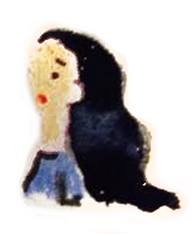 Sara:
Sara:
Despite the deep trust between us, I never felt comfortable bringing up my sexuality because of the stereotypical expectation that Samia’s immediate response would be of disgust. But when I decided to take the chance, Samia’s initial reaction surprised me. It was not a reaction of disgust, but one of tolerance and acceptance.
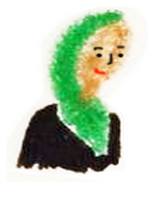
Samia:
Had Sara discussed her sexuality with me even a year before, the reaction might have been something completely different. My acceptance was conditioned by my profound experience of being exposed to new perspectives, which served to modify and solidify my own religious and spiritual beliefs. Becoming more confident in my own faith made me more accepting of the varied ways in which others demonstrate their own spiritualities. Together, Sara and I learned that we are in no position to decide who is included in the fold of Islam on the basis of his or her practice of Islam not aligning with our own.
The second moment: Samia’s grappling with questions of destiny in the context of marriage.
 Sara:
Sara:
As we move through the phases of adulthood in our lives, one of Samia’s pressing concerns has become marriage and finding her life partner, a quest which she is finding to be rife with uncertainty. During one particularly emotional conversation between us regarding Samia’s marriage prospects, I decided to assuage Samia’s questions and fears with the use of verses from the Quran, a decision that surprised her. I reminded Samia of the following verse: “Perhaps you hate a thing and it is good for you; and perhaps you love a thing and it is bad for you. And Allah Knows, while you know not” (2:216). Despite religious differences, I was able to relate to Samia on a spiritual level to help alleviate her emotional turmoil, demonstrating our ability to overcome established religious divisions like those we see in our university community.
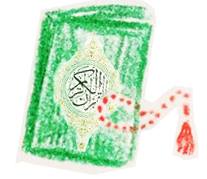
Both:
With these shared experiences and our friendship, we have come to the collective understanding that many of us come from incredibly homogenous cultural, ethnic and religious backgrounds. When these unique perspectives begin to interact in our collegiate space, we discover that the differences are not limited to merely between cultures or religions but are also present within religions including sects within Islam.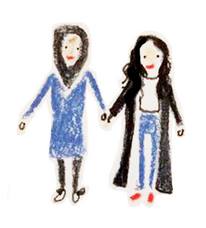
Various questions arise for us, especially for Muslims from different sects. Why don’t our practices align? From where do the variances in understandings stem? Exposure to only one form conditions us to believe that our personal interpretations of Islam are the only correct forms, a phenomenon that paves the way for sectarian conflict in a religion that is founded on the premise of peace. However, in actuality, the Islamic tradition has evolved into a multitude of sects, and we cannot deny that Shi’a, Sufi or Sunni Muslims are any less Muslim than we are.
As a community, we need to stop hastening to classify others into our own pre-labeled boxes and begin to embrace our complex diversity. After all, our university’s existence is predicated on the ideal of engaging in dialogue with those who are different from us. So next time, before you ask “But isn’t she conservative, liberal, fundamentalist or queer?” Ask yourself, “Why have I assumed this and, really, why does it matter?”
Email Samia Ahmed and Sara BZ at [email protected].


























































































































































